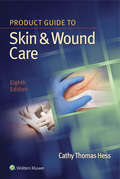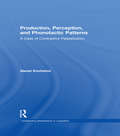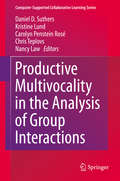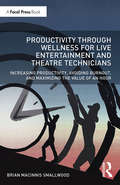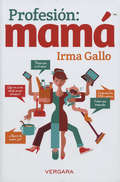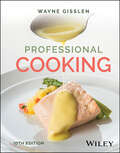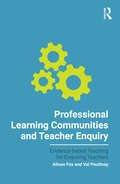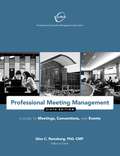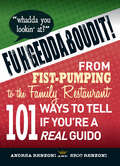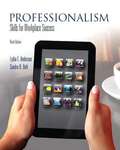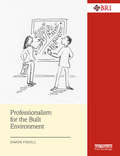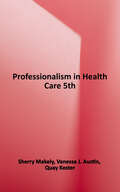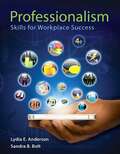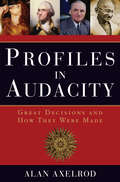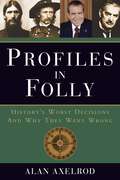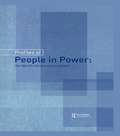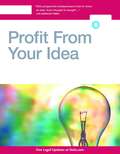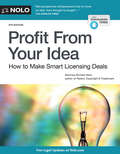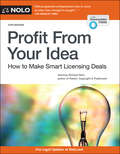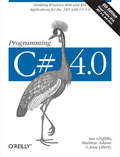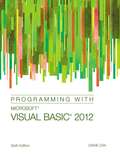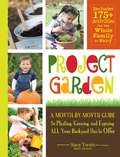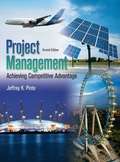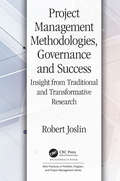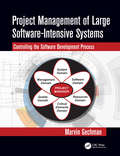- Table View
- List View
Product Guide to Skin & Wound Care
by Cathy HessChoose the best possible skin and wound care products to support your patients’ skin health and wound healing, with the invaluable Product Guide to Skin and Wound Care, 8th Edition. Listing 294 products in alphabetical order, this handy product guide for wound care practitioners across all practice settings offers detailed information—sizes, action, indications, contraindications, application, and removal information—so that your choices stay informed and accurate.
Production, Perception, and Phonotactic Patterns: A Case of Contrastive Palatalization (Outstanding Dissertations in Linguistics)
by Alexei KochetovFirst Published in 2002. Routledge is an imprint of Taylor & Francis, an informa company.
Productive Multivocality in the Analysis of Group Interactions
by Nancy Law Kristine Lund Daniel D. Suthers Carolyn Penstein Rosé Chris TeplovsThe key idea of the book is that scientific and practical advances can be obtained if researchers working in traditions that have been assumed to be mutually incompatible make a real effort to engage in dialogue with each other, comparing and contrasting their understandings of a given phenomenon and how these different understandings can either complement or mutually elaborate on each other. This key idea applies to many fields, particularly in the social and behavioral sciences, as well as education and computer science. The book shows how we have achieved this by presenting our study of collaborative learning during the course of a four-year project. Through a series of five workshops involving dozens of researchers, the 37 editors and authors involved in this project studied and reported on collaborative learning, technology enhanced learning, and cooperative work. The authors share an interest in understanding group interactions, but approach this topic from a variety of traditional disciplinary homes and theoretical and methodological traditions. This allows the book to be of use to researchers in many different fields and with many different goals and agendas.
Productivity Through Wellness for Live Entertainment and Theatre Technicians: Increasing Productivity, Avoiding Burnout, and Maximizing the Value of An Hour
by Brian MacInnis SmallwoodProductivity Through Wellness for Live Entertainment and Theatre Technicians provides the tools for individuals and organizations to achieve a healthy work–life balance and increase productivity in the production process of live entertainment. Through examination of the limits of the human body, the fundamentals of motivation, and best practices of project management, the reader will develop operational mindfulness and look at new ways to achieve work–life balance. The book explores case studies that show how organizations are promoting work–life balance and reaping the benefits of increased productivity, makes recommendations to reduce burnout and increase productivity among technicians, and discusses how to deal with the various phases of production. An excellent resource for live entertainment technicians, production managers, technical directors, arts managers, managers in live entertainment, and students in Technical Direction and Production Management courses, Productivity Through Wellness for Live Entertainment and Theatre Technicians offers practical solutions to improve the quality of life of employees, reduce the burnout and injuries of overwork, and maximize the value of an hour.
Profesión: Mamá
by Irma Gallo¿Eres de las mujeres que afirmaban vehementemente que nunca tendría hijos y un día, de pronto, sentiste que era el momento y te embarcaste en esta aventura? ¿Cuándo nació tu bebé te sentiste tan abrumada, tan sola, tan pequeña que sentiste que no ibas a poder con semejante tarea? ¿Amas tanto tu trabajo, profesión, oficio como a tu hijo y en ocasiones sientes que no le das la atención que merecen? ¿Tienes una pareja que te apoya con la crianza? ¿Eres una mamá sola que a menudo siente que no puede más con todo? ¿Eres un papá interesado en compartir a plenitud esta experiencia, y asumir las responsabilidades de la paternidad?
Professional Cooking
by Wayne GisslenThe Tenth Edition of Professional Cooking reflects the changing nature of our understanding of cooking and related fields such as food safety, nutrition, and dietary practices, as well as the latest thinking about how best to teach this material. Chapters include relevant cultural and historical background for international recipes and cooking practices. What has not changed is the core material that focuses on the essentials — the comprehensive understanding of ingredients and basic cooking techniques that are the foundation of success in the kitchen, and the development of fundamental skills to apply this knowledge.
Professional Learning Communities and Teacher Enquiry (Evidence-based Teaching for Enquiring Teachers)
by Alison Fox Val PoultneyEvidence-based teaching is fast becoming a new orthodoxy. There are many strong voices, including policy voices, advocating its adoption. Understanding the underlying principles allows you to better evaluate the benefits of different approaches to evidence-based teaching and how they relate to your own school context.This book provides a critical overview of different ways of thinking about professional learning as a social process through collaborative and collective activity, including the notion of professional learning communities and how these might be used to support teacher enquiry. It examines the opportunities and challenges this poses to teachers and school leaders, and includes practical advice on how to facilitate, engage with and evaluate collaborative teacher enquiry models.
Professional Meeting Management: A Guide To Meetings, Conventions And Events
by Professional Convention Management Association StaffThe sixth edition of Professional Meeting Management is the newest edition of the longtime standard reference and textbook for the meetings industry and meetings education. This is the first student and meeting professionals textbook aligned with the new Certified Meeting Professional (CMP) International Standards, which will be used by the Convention Industry Council as a reference book for item writing for the CMP Certification Examination. It includes the most up-to-date information on current trends, strategic planning for meetings, budgeting and funding, marketing and promotion, technology, running and closing the meeting, and industry developments on the horizon.
Professional Services for Writers: Comprehensive contact information for freelance editors, proofreaders, self publ ishers, and other service providers used by writers
by UnknownFrom the editors at Writer's Digest, this fantastic resource for romance writers details hundreds of magazine and book publishers who are interested in acquiring and publishing new romantic fiction. Each market listing provides information on where the publisher is located, what they're looking for, who to contact, how to reach them, and what their terms are. Each entry also comes with special insider tips for getting their attention. You want to get your romance published? Start by looking here.
Professionalism Skills for Workplace Success (Third Edition)
by Lydia E. Anderson Sandra B. BoltThe book designed as a workbook that can be kept and referred to throughout one's career addresses employer concerns by providing those new to the workplace with basic skills for success on the job and providing job seekers the tools they need to secure the job of their dreams. This unique text prepares students for their first professional workplace experience by linking self-management issues to career planning tools and workplace basics, including expected behaviors.
Professionalism for the Built Environment (Building Research and Information)
by Simon FoxellIn the aftermath of the Grenfell Tower tragedy, this new book provides thought provoking commentary on the nature of the relationship between society, the prevailing economic system and professionalism in the built environment. It addresses the changing responsibilities of professionals and in particular their obligation to act in the wider public interest. It is both an introduction to and an examination of professionalism and professional bodies in the sector, including a view of the future of professionalism and the organisations serving it. Simon Foxell outlines the history of professionalism in the sector, comparing and contrasting the development of the three major historic professions working in the construction industry: civil engineering, architecture and surveying. He examines how their systems have developed over time, up to the current period dominated by large professional services firms, and looks at some options for the future, whilst asking difficult questions about ethics, training, education, public trust and expectation from within and outside the industry. The book concludes with a six-point plan to help, if not ensure, that the professions remain an effective and essential part of both society and the economy; a part that allows the system to operate smoothly and easily, but also fairly and to the benefit of all. Essential reading for built environment professionals and students doing the professional studies elements of their training or in the process of applying for chartership or registration. The issues and lessons are applicable across all building professions.
Professionalism in Health Care: A Primer for Career Success
by Sherry Makely Vanessa J. Austin Quay KesterA balanced introduction to the standards and skills needed to succeed in health care Professionalism in Health Care: A Primer for Career Success is a full-color, engaging, conversational text that helps students understand the common professional standards that all health care workers need to provide excellent care and service. It brings together complete coverage of these and other crucial soft skills: work ethic, character, relationships, teamwork, communication and etiquette, honesty, cultural competence, personal image, and personal health and wellness. <p><p> Revised and improved throughout, this edition gives students a clear understanding of where they fit in the changing health care system, why patient satisfaction is more important than ever, how to behave with the professionalism that both employers and patients demand, and how to move forward in their own careers.
Professionalism: Skills for Workplace Success
by Lydia Anderson Sandra BoltProfessionalism, 4th Edition prepares students for their first professional job, providing career planning tools, expected behaviors, and soft skills essential for career success. Ample exercises and activities help students immediately apply concepts and materials for transitioning from the classroom to a work environment. Three pillars for professional success―life planning, workplace skills, and career planning―are emphasized throughout. Students learn to connect personal, professional, and financial goals and understand how these goals ultimately contribute to career success through the creation of a life plan that addresses short- and long-term personal, professional/career, and financial goals. <p><p>Recognizing that attitude, communication, and human relations are the keys to surviving in today’s challenging, competitive, and uncertain workplace, students will develop practical human relations skills with a primary emphasis on soft skills and expected workplace behaviors; and are provided detailed career planning tools that focus on job search strategies, résumé package development, and interview techniques.
Profiles in Audacity: Great Decisions and How They Were Made
by Alan AxelrodA journey of exploration through history’s great decisions and those who had the courage to make them.In brief, compelling, and inspiring vignettes, bestselling historian Alan Axelrod pinpoints and investigates the make-or-break event in the lives and careers of some of history’s most significant figures. Axelrod reexamines history by revealing the answer to the fascinating question of why the people who made history made their choices—and conveys the resonance of those choices today. The 46 profiles range from ancient times to the present day and include Cleopatra’s decision to rescue Egypt; Washington’s decision to cross the Delaware and win; Gandhi’s decision to prevail against the British Empire without bloodshed; Truman’s decision to drop the A-bomb and end WW II; Rosa Parks decision to sit in for civil rights; Boris Yeltsin’s decision to embrace a new world order; and Flight 93’s decision to take a stand against terror. Alan Axelrod is the prolific author of over 60 books on subjects covering history, business, and management, including the bestsellers Patton on Leadership; Elizabeth I, CEO; and What Every American Should Know About American History: 200 Events That Shaped the Nation (with Charles Phillips). He has spoken at management and leadership seminars around the country, and has served as consultant to companies and institutions including Siemens AG and the Metropolitan Museum of Art. He has appeared on MSNBC, The Discovery Channel, CNN, Fox, and numerous radio news and talk programs, including NPR. Axelrod and his work have been featured in BusinessWeek, Fortune, Men’s Health, Cosmopolitan., and many newspapers, including USA Today.
Profiles in Folly: History's Worst Decisions and Why They Went Wrong
by Alan AxelrodUsing the same engrossing anecdotal format that proved so popular in Profiles in Audacity, bestselling author Alan Axelrod turns to the dark side of audacious decision-making and explores historys most tragic errors. While Axelrod looks at the hopelessly dumb and the overtly evil, the main focus is on smart people who had the best of intentions--but whose plans went disastrously wrong. The 35 compelling stories include: the sailing of the “unsinkable” Titanic; Edward Bernayss 1929 campaign to recruit women smokers; Neville Chamberlains appeasement of the Nazis; Ken Lays deception with Enron; and even the choice to create a “New Coke” and fix what wasnt broke. These are cautionary tales--albeit with exquisite twists ranging from acerbic to horrific.
Profiles of People in Power: The World's Government Leaders
by Roger East Richard J. ThomasThis new work of biographical reference presents succinct narrative biographies of every serving head of state and head of government.Its content covers approximately 200 countries and territories and provides over 300 biographical profiles.Each country section contains:* A brief explanation of its type of government and the roles of the head of state, the head of government and the legislature* Lists of the most recent heads of state and head of government, with dates of office* Biographical profiles of current head of state and government, and other recent incumbents of these positions who remain significant and active political leaders* A photographic section of a selection of the world's key political leaders* A full index by name, date of taking office, and source of authority.
Profit From Your Idea
by Richard StimYou've invented a great product and it's time for the next step. However, if you present an invention to a prospective buyer or licensee, it's no secret that your idea can be stolen. How can you draft an agreement that protects your interests? Turn to Profit From Your Idea to help you create, modify and understand nondisclosure agreements specifically for inventors. In addition to providing sample agreements and practical advice, this all-in-one guide helps you: understand the licensing process determine ownership rights work with agents effectively find potential licensees publicly show inventions without the risk negotiate a fair licensing deal draft a comprehensive licensing agreement deal with international licensing Disclosing your invention requires a balancing act: Presenting the best aspects of your invention while protecting the confidential aspects of your work. Use Profit From Your Idea to help you effectively maintain the necessary balance and minimize the risks of disclosure. The fully updated edition comes complete with the latest licensing case law and includes brand new FAQs, many from the author's popular blog, Dear Rich: Nolo's Patent, Copyright & Trademark Blog.
Profit From Your Idea: How to Make Smart Licensing Deals
by Richard StimLicense your invention without the risk -- protect your idea You’ve got a great idea and are ready to strike it rich. But finding a company you can trust, hashing out a fair licensing deal, then watching your idea hit the marketplace—well, you’ll need help. Turn to Profit From Your Idea. It will help you negotiate and draft a licensing agreement that will protect your interests. In the end, you’ll know all about: the licensing process your intellectual property rights ownership issues for inventor-employees working with licensing agents protecting confidential information finding potential licensees licensing overseas showing your invention safely negotiating your agreement reviewing changes to an agreement Disclosing your invention requires a balancing act: Presenting the best aspects of your invention while protecting the confidential aspects of your work. Use Profit From Your Idea to help you effectively maintain the necessary balance and minimize the risks of disclosure. The fully updated edition comes complete with the current licensing law and patent rules, as well as includes brand new FAQs, many from the author's popular blog, Dear Rich: Nolo's Patent, Copyright & Trademark Blog.
Profit From Your Idea: How to Make Smart Licensing Deals
by Richard StimAll you need to protect and profit from your invention You’ve got a great idea and you’re ready to strike it rich. Now, you need to find a company or partner you can trust, hash out a fair licensing deal, and get your idea to the marketplace. Profit From Your Idea will help you negotiate and draft a licensing agreement that protects your interests and maximizes your chances of earning a profit. With this all-in-one guide you’ll understand how to: navigate the licensing landscape protect your intellectual property rights sort out ownership rights work with licensing agents protect confidential information find and solicit potential licensees license overseas reveal your invention safely, and negotiate and update an agreement. The 10th edition is completely updated with the latest developments in licensing law and patent filing rules, and covers industry-standard Fair, Reasonable, and Nondiscriminatory (FRAND) licensing terms. With Downloadable Forms: download forms including license agreements, assignments, joint ownership agreements, and many more (details inside).
Programming C# 4.0: Building Windows, Web, and RIA Applications for the .NET 4.0 Framework (Animal Guide)
by Matthew Adams Jesse Liberty Ian GriffithsWith its support for dynamic programming, C# 4.0 continues to evolve as a versatile language on its own. But when C# is used with .NET Framework 4, the combination is incredibly powerful. This bestselling tutorial shows you how to build web, desktop, and rich Internet applications using C# 4.0 with .NET's database capabilities, UI framework (WPF), extensive communication services (WCF), and more.In this sixth edition, .NET experts Ian Griffiths, Matthew Adams, and Jesse Liberty cover the latest enhancements to C#, as well as the fundamentals of both the language and framework. You'll learn concurrent programming with C# 4.0, and how to use .NET tools such as the Entity Framework for easier data access, and the Silverlight platform for browser-based RIA development.Learn C# fundamentals, such as variables, flow control, loops, and methodsBuild complex programs with object-oriented and functional programming techniquesProcess large collections of data with the native query features in LINQCommunicate across networks with Windows Communication Foundation (WCF)Learn the advantages of C# 4.0's dynamic language featuresBuild interactive Windows applications with Windows Presentation Foundation (WPF)Create rich web applications with Silverlight and ASP.NET
Programming with Microsoft Visual Basic 2012, 6th Edition
by Diane ZakPROGRAMMING WITH MICROSOFT VISUAL BASIC 2012, 6E by best-selling author Diane Zak is the ideal choice for your introduction to programming. Readers learn to master the basics of effective programming as they work through a wealth of hands-on applications in this book's engaging real-world setting. Numerous learning features address today's varied learning styles with an approachable visual presentation, helpful step-by-step tutorials, and engaging "You Do It" activity boxes. Even students with no prior programming experience learn how to effectively plan and create interactive Windows applications. This edition emphasizes GUI design skills and object-oriented programming concepts throughout.
Project Garden: A Month-by-Month Guide to Planting, Growing, and Enjoying ALL Your Backyard Has to Offer
by Stacy TornioThe family that gardens together, grows together!In this beautiful, project-by-project guide, mom and master gardener Stacy Tornio will inspire gardeners young and old to explore, innovate, and cultivate through simple projects that will get a garden growing at any time of year. Your whole family be inspired to:Tend beautiful, practical gardens that work in any spacePlant flowers as colorful as they are hardyWhip up delicious meals from vegetables you planted yourselfDecorate your garden with nature-inspired craftsGive the gift of growing, with divided plants, cuttings, and seeds you save yourself Best of all, whether you are tending flowerbeds in spring, stewing July's tomatoes, or coaxing bulbs to bloom mid-winter, you'll be doing it together.
Project Management (2nd Edition)
by Jeffery K. PintoProject Management employs a managerial, business-oriented approach to the management of projects, which is reinforced throughout the text with current examples of project management in action. Introduction: Why Project Management?; The Organizational Context: Strategy, Structure, and Culture; Project Selection and Portfolio Management; Leadership and the Project Manager; Scope Management; Project Team Building, Conflict, and Negotiation; Risk Management; Cost Estimation and Budgeting; Project Scheduling: Networks, Duration Estimation, and Critical Path; Project Scheduling: Lagging, Crashing, and Activity Networks; Critical Chain Project Scheduling; Resource Management; Project Evaluation and Control; Project Closeout and Termination For readers or future mangers interested in understanding the fundamentals of project management from a variety of business applications and examples.
Project Management Methodologies, Governance and Success: Insight from Traditional and Transformative Research (Best Practices and Advances in Program Management)
by Robert JoslinProject management methodologies, practices, and guidelines are the only explicit information that project managers have and, when properly maintained, should reflect the most current knowledge and guidance to achieve repeatable successful project outcomes. Despite more than 50 years of research in the field of project management, project success r
Project Management of Large Software-Intensive Systems
by Marvin GechmanThe book describes how to manage and successfully deliver large, complex, and expensive systems that can be composed of millions of line of software code, being developed by numerous groups throughout the globe, that interface with many hardware items being developed by geographically dispersed companies, where the system also includes people, policies, constraints, regulations, and a myriad of other factors. It focuses on how to seamlessly integrate systems, satisfy the customer’s requirements, and deliver within the budget and on time. The guide is essentially a “shopping list” of all the activities that could be conducted with tailoring guidelines to meet the needs of each project.
